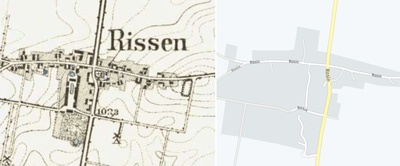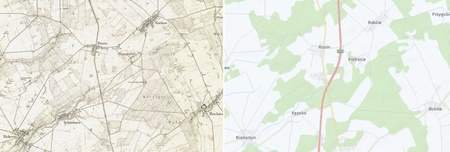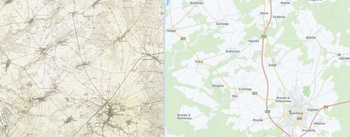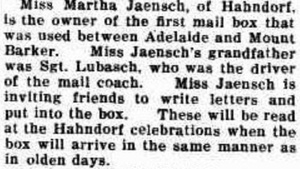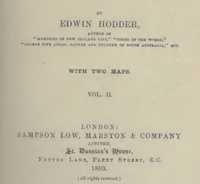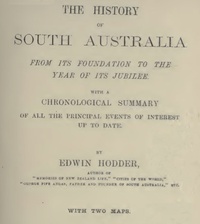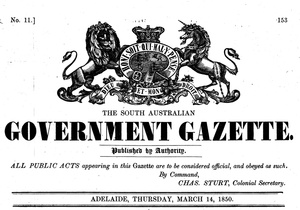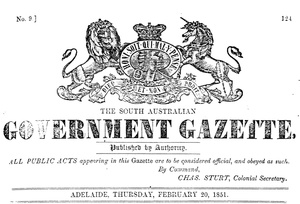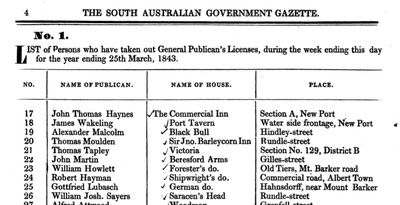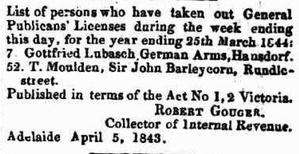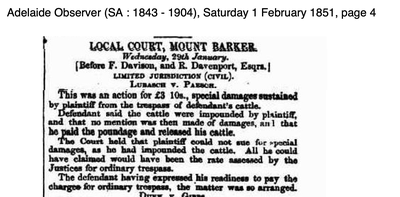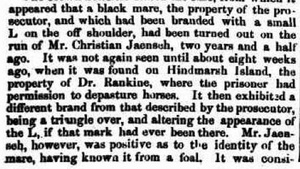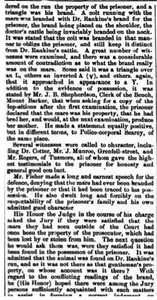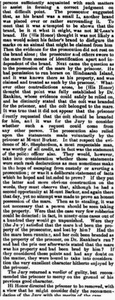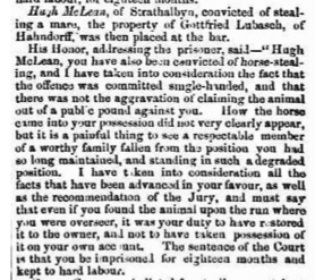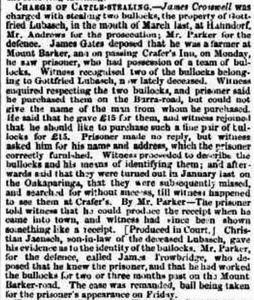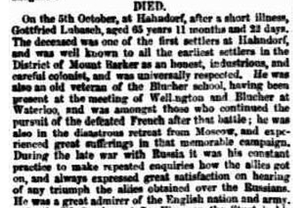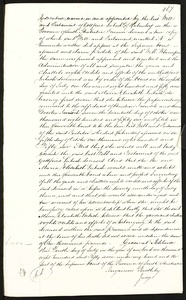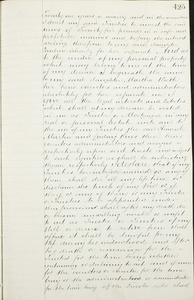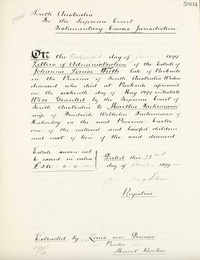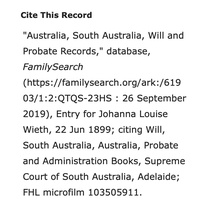This Page forms part of the overall Zebra-ProjectBy clicking on the following Link a list of all Zebra-Project tabbed pages will be displayed. |
Johann Gottfried LUBASCH1st wife Caroline WOLF - 2nd wife Anna Dorothea GREISER
Information re Johann Gottfried LUBASCH is divided into 3 distinct parts as follows: Part 1 - His life, marriages, families, in-laws, shearing employment of his daughters and his involvement in the Battle of Waterloo, 1815. Part 2 - His daughters, their marriages, their lives, their connections Part 3 - Maria Elisabeth LUBASCH the beneficiary of her father's will, contested 1857 in the Supreme Court by 3 brothers in law Part 4 - His land, home, barn & property dealings including tracing all the Certificate of Titles for section 3812 from 1844-1990. All articles related to section 3812, Hd Kuitpo
The above Parts includes photographs and images from the John MUELLER Photograhic Collection, unless indicated otherwise. Return to the Index of: articles related to section 3812 |
Summary - Part 1
The author is related to Johann Gottfried LUBASCH through his marriage 1819ca with his first wife Caroline WOLF.
- Their 1st child Johanne Luise LUBASCH who married Johann Gottlieb WIETH and arrived in South Australia in 1855, with 3 of their eventual 5 children.
- Their first child Caroline Henriette WIETH married Johann Gottfried MANGELSDORF in 1864.
- Their 3rd child Anna Pauline MANGELSDORF married Theodore Christoph Otto FEHRMANN [sic] in 1887 who were the author's great grandparents.
- Johanne Luise LUBASCH & Johann Gottlieb WIETH had two more children in South Australia, the last one being Auguste Martha WIETH who married in 1882 Johann Friedrich Wilhelm FAHRMANN [sic]. This J.F.W. FAHRMANN is Theodore Christoph Otto FEHRMANN's nephew.
And
- Johann Gottfried LUBASCH's second wife, the one who arrived in South Australia with him on the 'Zebra' in 1838 is Johanna Dorothea GREISER.
- They had 5 daughters and the second one Johann Caroline LUBASCH married in 1847 Johann Gottlieb LIEBELT.
- His younger sister Johanne Eleonore LIEBELT married Johann Carl Friedrich FÄHRMANN in 1854 who are the author's great great grandparents.
- This couple are the parents of Theodore Christoph Otto FEHRMANN and J.F.W. FAHRMANN is their grandchild.
This Part 1 of 3 articles provides information about the life & employment of Gottfried LUBASCH, his wives and 7 daughters, his 2 marriages, his involvement in the Battle of Waterloo, the land he acquired while being a publican, a postal contractor & an introduction to his sons in law, THIELE, JAENSCH, WIETH & LIEBELT (x2) who feature predominately in Part 2 for their part in contesting the Will following the death of their father -in -law.
Johann Gottfried LUBASCH and his second wife Anna GREISER are also John MUELLER, Marion LIEBELT and Rex LIEBELT's Great, Great, Great Grandparents
The Family Names that are Mentioned in this Article:
BARTEL, BRAUER, BRASSE, BULL, BUTLER, DUNN, BLUCHER, DOHNT, GREISER, GATES, GENSCH, GILES, HARMSTORF, HAEBICH, HOLTHOUSE, IDE, JÄNSCH, JENSCH, KRESS, KOOK, KUSS, LUUR FOX, ,LUBASCH, LIEBING, LIEBELT, LINKLATER, MARSDEN, MARTIN, MILLER,, MILLER, KWASCHNICK,, THIELE, MACFARLAN, KLENKE, , MCFARLANE, , , PAECH, PALTRIDGE, SCHUETZ, SCHUBERT, SMITH, SPENCE, MANGELSDORF, FAEHRMANN, STOW, HUNT. YOUNG, Von DOUSSA, WELLINGTON, WOLF, WIETH, WITTWER, WILLIAMS
Table of Contents
3. Sergeant LUBASCH at the Battle of Waterloo
5. LUBASCH Hahndorf's policeman
6. LUBASCH's daughters shear sheep
8. Hahndorf Village land allocation
9. The mothers & 7 daughters
10.. 1856 Obituary
11. WILLS
1. Births, Marriage, and Death
1.1 Johann Gottfried LUBASCH
- Born: 17 October 1790
- Married: 1819ca
- Widowed: 1823ca at 33 years of age
- Died: 5 October 1856
- Buried:
1.2 Caroline WOLF
- Born: 1790
- Married: 1819ca
- Died: 1823ca at 33 years of age, children were 3 years & 2 years of age.
- Buried: Prussia
1.3 Anna Dorothea GREISER
- Born: 1799
- Married: 1823ca
- Widowed: 1856 at 57 years of age
- Died: 19 October 1864
- Buried: 'St Paul's and St John's Lutheran Cemetery Hahndorf by E.A. WITTWER'
- 'St John's Cemetery. Anna Dorothea LUBASCH
- *ca1799 as Anna Dorothea GREISER. Became the second wife of Gottfried LUBASCH of Rissen, Province Brandenburg, Arrived on the "Zebra" in January 1839. Lived at Hahndorf where her husband was the first licensee of the "German Arms" hotel.
- + 19 October 1864 aged 65 years. Buried on 21 October 1864 by Pastor GLA FIEDLER. Her husband is buried in the Hahndorf Pioneer Cemetery.'
2. Arrival in South Australia.
Lutheran Church website, https://www.lca.org.au/captain-compassion/
Compassion by Rachel KUCHEL, 10 April 2014 'Conditions on the ship were difficult. Originally built for cargo, the Zebra had to be suitably refitted for Hahn’s charges. The carpenter who built the sleeping berths for the passengers was less than proficient, with the top bunks collapsing onto those below. Most passengers, including Behrend, Boehm, Janetzki, Lubasch, Rillricht, Süss and Zimmermann, were quickly seasick, a misery that was not alleviated by the ship’s fare, a diet considerably richer than their usual milk and potatoes. There were eight deaths within the first month, followed by the onset of scurvy. Hahn recommended rations of sauerkraut and daily fumigation of the holds. He also slaughtered his personal pig for the passengers’ consumption.'
2.1 LUBASCH family arrive on ship 'ZEBRA' January 1839
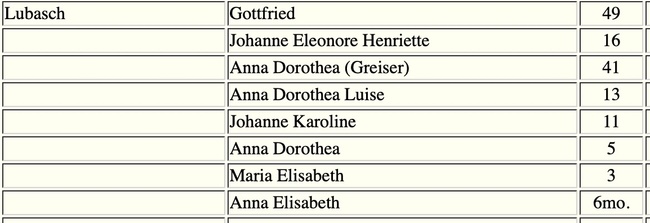 LUBASCH family Passengers on ship Zebra 1839
LUBASCH family Passengers on ship Zebra 1839
There were 96 children on the ‘Zebra’ under the age of 16 years, five of them were Gottfried’s daughters.
2.2 LUBASCH / WOLF / GREISER came from Rissen, Brandenburg, Prussia.
David SCHUBERT in 'Kavel's People' states that LUBASCH, his second wife and 5 of their daughters were from Rissen in Brandenburg and they arrived on the 'Zebra' for which there are no official passenger lists. [page 166]. ‘Early this century Pastor A. BRAUER compelled a list, drawing on various sources, including conversations with some of the surviving pioneers. A revision of this list by Allan WITTWER was included in the PAECH family history. The following list is based on BRAUER's and WITTWER's work and also takes into account the lists of emigrants in Iwan's 'Um des Gladdens Willen' and various information on the early Germans in South Australia, such as agricultural returns and the names on page 53 of Opie’ [page 165 ‘Kavels People’]
2.3 Rissen / Rosin
Rissen, Züllichau-Schwiebus, Frankfurt, Brandenburg, Preussen is now the village of Rosin, Lubusz Voivodeship in western Poland & has an estimated population of 281. It is 26 kms north of Zielona Góra & 10 kms south of Świebodzin. A busy freeway runs through the centre & the small kink in the main road is still seen today. The brown & white maps are from Meyers Gazeteer 1848 and each map is being compared with a current day map of the same area.
3. Sergeant LUBASCH at the Battle of Waterloo
3.1 J. DUNN Memoirs 1886 “History 1839-1849 Gottfried Lubasch
'Gottfried LUBASCH, the founder of the German Arms, was born in 1790. In 1812, aged 22, he joined General Count Yorck's Prussian troops, which had to fight with Napoleon's army in Russia. Three years later, in 1815, LUBASCH, sounded the bugle for the Prussians to join in the Battle of Waterloo, when they helped to defeat Napoleon completely. During the 1820s and 1830, G LUBASCH, worked a small farm at Rissen, a village near the Oder River, south-east of Berlin. He married twice and had a family of daughters. In 1838, the LUBASCH, family came as Lutheran refugees to South Australia, to avoid religious persecution in their homeland. Early in 1839, Gottfried LUBASCH, became a foundation Hahndorf settler and soon opened a coffee shop in his main street home. By December 1839, he had turned this business into a hotel, 'rather of the Germanic order.'
3.2. 1838 Starve-dog-lane
1888 Adelaide Observer [SA:1843-1904] ‘Reminiscences of the Old Port, 1838-1839’ by Edward Holthouse, published 1 September & 15 September
South Australiana Vol 20, no1, March, 1981. - Handwritten copy of the first part deposited in the Archives 1935 (Accession A773) From this copy that the present edition in the South Australiana was compiled. Edward Holthouse born England c1813. Arr SA July 1838 Duke of Roxburgh . Merchant, pastoralist, storekeeper along the Murray. Nov 1856 Secretary to the Destitute Board. Page 34 ‘Convenient to butcher Lillyman’s was a baker’s oven under a lean to kept by a tall German, who fund a ready sale for his bread at 2/6 the 2lb loaf.’ As the winter approached….. I purchased a small freehold with water frontage for 11 pound.…… two other shanties of the same size and pattern made a row of five. They were all minus chimney and windows. For some reason or other this row went by the name of “Starve-dog-lane”. What constituted a lane, I suppose, was a large encampment of German emigrants who had pitched their tents in a paralled line on the opposite side of the row.
They were recent arrivals from Germany by the Ships ‘Zebra’ and ‘Prince George’ and were the pioneers and founders of the little rural hamlet of Hahndorf, which derives its name from Captain Hahn, the master of the ‘Prince George’, who was much respected by his passengers. We neighbours were not long in fraternising with out Teuton friends, who were a quiet and very industrious people, and as it afterwards turned out extremely useful to. Some of the older men had seen service in the wars of their Country. One gaunt old veteran had fought under Blucher when that tough old Marshal was defeated at Ligny on June 16 (1815), but his regiment arrived in time to participate in the overthrow of Bonaparte on the memorable 18th (1815, Battle of Waterloo) for which he received the Waterloo Medal. He was the proprietor of the first public-house built at Hahndorf. It was a primitive and rustic little hostelry, celebrated in its day for home-made bread, sweet fresh butter, and delicious bacon. [See South Australian Government Gazette 12 December 1839, Godfrey Luhbasch licensee of the German Arms Hotel.]
Prior to the arrival of the German Emigrants the Port had been supplied with water by bullock drivers…. carried empty drays a bucket and cask which they filled from the Torrens when crossing the ford (west of the Adelaide Railway Station)……..it so happened that about the time of the arrival of the Germans a spring of excellent fresh water was struck a few feet from the surface …..’Old Halfway House’ on the Port Road…. The German emigrants then took up the trade, …..rigged up extempore sledges out of the forks of she oak trees, and the young men and girls, yoking themselves together, were to be met at all hours of the day dragging casks of water through the heavy sand from the well to the Port, which industry reduced my water rate from sechs groschen to vier groschen a bucket. [Authors note: 6 dimes to 4 dimes]
My laundress, a fair haired young Saxon, gave us to understand about the same time in her best English that now “wasser” was plenty she would make a great reduction in her washing charges, which intimation harmonized exceedingly with my views of the domestic economy. The time soon came, however, when we had to witness, perhaps with a little selfish regret, the breaking up of this German little canvas town. Their tents had been a sort of protection against easterly winds and sand drifts; besides their departure denuded our quarters of half its population…..’
3.3 The Australian Lutheran Almanac 1928 page 58
'A few pages from the life of the Fathers.' "Tho' much is taken, much abides" by Pastor A. BRAUER, 'A Waterloo Veteran'
"Among the early settlers was a Waterloo veteran, by the name of LUBASCH, who now has a large number of descendants (grandchildren, great-grandchildren and great-great-grandchildren) in Hahndorf and vicinity. This LUBASCH had been a sergeant in the Prussian artillery at the battle of Waterloo, and often entertained the people by relating incidents of old BLUCHER and the Napoleonic war. John Bull, in his "Early Recollections," has this to say of the brave old pioneer;- "Many a hard battle of words have I fought with the old sergeant, but never succeeded in convincing him that the battle of Waterloo was won before the arrival of old BLUCHER.Lubasch claimed to have been with the advanced detachment of guns which unlimbered and fired the first volley, and saved, as he maintained, the English army." Another old Hahndorf settler who arrived a year or two later, and had fought in the British Army under Wellington, substantially confirmed the claim of the old sergeant.
Examined in the light of history, the claim of Sergeant LUBASCH appears to be somewhat near the truth than the contention of his opponent, who himself was one of the grand old pioneers, but had not been a participant in the titan struggle at Waterloo. Here is what the "Iron Duke" WELLINGTON, himself said in his famous despatch after the great battle: "And having observed the French troops retire from the attack" [of the Prussians] "in great confusion, and that the march of General BULOW's troops by Frischermont and Planchenoit and La Belle Alliance had began: and as I could perceive the fire of his canon and a Marshal BLUCHER had joined in person with a corps of his army to the left of our line by Ohain, I determined to attack the French." Again: "I should not do justice to my own feelings or to Marshall BLUCHER and the Prussian army if I did not attribute the successful result of this arduous day to the cordial and timely assistance I received from them.
The operation of General BULOW upon the enemy's flank was a most decisive one; and even if I had not found my self in a situation to make the attack which produced the final result it would have forced the French to retire if his attacks failed and would have prevented him from taking advantage of them if they should have unfortunately have succeeded."
It should also be remembered that in Wellington's army there were [besides 17,488 Netherlands] 21,017 Germans & 25,389 British & that "Waterloo Prize Money" to the amount of 978,849 pounds, was distributed among the rank file. Germans & Netherlanders sharing alike with the British. Again, on the front of the house at La Belle-Alliance, where WELLINGTON and BLUCHER met on the evening after the battler, there is the commemorative inscription that here WELLINGTON & BLUCHER met, and "mutually greeted each other as victors. That inscription tells the tale and the truth very tersely. But this excursion, occasioned by the reference to the old sergeant at Hahndorf, by the way.
3.4 1928 Pastor BRAUER ‘A Waterloo Veteran’
'Register' Saturday 28 January 1928 "Unwritten Chapters" Interesting Notes by Pastor BRAUER. 'A Waterloo Veteran'.
- The above article was reposted in part in the Register.
3.5 I saw Moscow burning:
More Snippets by Reg BUTLER. “LUBASCH, Gottfried (1789-1856). A native of Brandenburg, Prussia. Gottfried Lubasch had served in Napoleon’s army in Russia in 1813, where he saw the burning of Moscow. Gottfried was Hahndorf’s first hotelkeeper, mailman and policeman. Later, he farmed between Hahndorf and Balhannah.”
3.6 1933 Chronicle [Adelaide, SA:1895-1954]
Thursday 21 September, page 50. "....Sergeant LUBASCH [an old Waterloo veteran, who subsequently became a local character as the keeper of a coffee house]." "I mentioned Sergeant LUBASCH among the pioneers…..but the only thing that ran the veteran of Waterloo was his pipe …. there was only one way to get even with Sergeant LUBASCH…. tell him the British won the battle of Waterloo before the Prussians got there. That was rank heresy, and the only thing which would shake the phlegmatic old German out of his habitual calm.”
3.7 1856 Obituary Johann Gottfried LUBASCH.
“On the 5th October, at Hahndorf, after a short illness, Gottfried LUBASCH, aged 65 years 11 months and 22 days. The deceased was one of the first settlers at Hahndorf, and was well known to all the earliest settlers in the District of Mount Barkers as an honest, industrious, and careful colonist, and was universally respected. He was also an old veteran of the Blucher school, having been present at the meeting of WELLINGTON and BLUCHER at Waterloo, and was amongst those who continued the pursuit of the defeated French after that battle; he was also in the disastrous retreat from Moscow, and experienced great sufferings in that memorable campaign. During the late war with Russia it was his constant practice to make repeated enquiries how the allies got on, and always expressed great satisfaction on hearing of any triumph the allies obtained over the Russians. He was a great admirer of the English nation and army."
This obituary was duplicated in the Adelaide Observer 11 October 1856 page 5
3.8 Authors summary of LUBASCH & the Battle of Waterloo
-
In 1812, aged 22, LUBASCH joined General Count YORCK'S Prussian troops, which had to fight with Napoleon's army in Russia.
-
He served in Napoleon’s army in Russia in 1813, where he saw the burning of Moscow.
-
Two years later the Prussians have joined the English, Dutch & others to overthrow Napoleon.
-
LUBASCH's regiment arrived in time to participate in the overthrow of Bonaparte on the memorable 18th [1815, Battle of Waterloo] for which he received the Waterloo Medal, he was 25 years of age.
-
In 1815 LUBASCH sounded the bugle for the Prussians to join in the Battle of Waterloo, when they helped to defeat Napoleon completely.
-
Claimed to have been with the advanced detachment of guns which unlimbered and fired the first volley, and saved, as LUBASCH maintained, [& history has acknowledged] the English army.
-
LUBASCH was also an old veteran of the BLUCHER school, having been present at the meeting of WELLINGTON and BLUCHER at Waterloo, and was amongst those who continued the pursuit of the defeated French after that battle; he was also in the disastrous retreat from Moscow, and experienced great sufferings in that memorable campaign. During the late war with Russia it was his constant practice to make repeated enquiries how the allies got on, and always expressed great satisfaction on hearing of any triumph the allies obtained over the Russians. He was a great admirer of the English nation and army.
-
One gaunt old veteran had fought under BLUCHER when MARSHAL was defeated at Ligny on June 16 (1815)
-
LUBASCH was a sergeant in the Prussian artillery at the battle of Waterloo, and often relating incidents of BLUCHER and the Napoleonic war.
-
LUBASCH was never convinced that the battle of Waterloo was won before the arrival of old BLUCHER.
-
An old Hahndorf settler who arrived a year or two later, [1840] and had fought in the British Army under Wellington, substantially confirmed the claim of the old sergeant.
-
During the 1820s and 1830’s he worked a small farm possibly around Rissen, Prussia.
4. LUBASCH, acted as Hahndorf's first Postman - Postal Contractor
1844 LUBASCH & his daughter, the Postal Contractors
Regular Mail Services: The first post office was in the front room of SHEPHERDSON's hut in 1842. The first regular mail service between Mt Barker and Adelaide was established in about 1844 by a man named LUBASCH, a Lutheran emigrant who lived at Hahndorf. His daughter would walk from Hahndorf to Mt Barker to collect the mail, returning on foot to Hahndorf, where her father would take it on to Adelaide in a small cart that he had brought out from Prussia with him, into which he had harnessed two Timor ponies. He would make the trip to Adelaide one day, and return home the next. He did this mail run once per fortnight. After the opening of the railway service, the mail was carried by train for a time, and later still I twas, and still is transported by registered mail contractors to Adelaide."
1904 Adelaide Observer [SA : 1843-1904] Saturday 11 June page 36.
‘Mr LUBASCH also secured the first mail contract, and twice a week his grey ponies went to and from Adelaide with mails, produce and provisions. The same conveyance also brought the Mount Barker mails, which were carried to their destination on foot by one of Mr LUBASCH's family, when the blacksmith did not happen to be going that way.’
1911 Obituary: Anna Maria Dorothea LUBASCH
1911 South Australian Register [Adelaide, SA: 1839-1900] Tuesday 14 February page 7
‘Mr LUBASCH was in the early days contractor for the conveyance of mails between Adelaide and Mount Barker, and many times had Mrs JAENSCH carried on foot the Mount Barker mailbag from Hahndorf.’
1933 Chronicle [Adelaide, SA: 1895-1954] Thursday 21 September, page 50
- "....Sergeant LUBASCH [an old Waterloo veteran, who subsequently became a local character as the keeper of a coffee house]." "I mentioned Sergeant LUBASCH among the pioneers. He was a noted character. When he wasn't running the mails he was running a coffee house, and when he wasn't running the coffee house he was running the mails between Mt Barker and Adelaide. Sometimes he was running both. But the only thing that ran the veteran of Waterloo was his pipe - a huge contraption that almost consumed the output of a tobacco factory. The man was never born who could separate him from his pipe. If you took trip as a passenger in the "mail coach" of old man LUBASCH you would be quite safe in betting yourself that you would have a thrilling journey. The "coach" was a square wooden box without springs, mounted on to a wooden axle, and was capable of inflicting more bruises to the square inch than any other vehicle ever made. It was drawn by two lively Timor ponies, who shared their owner's belief that the straight course was the best course. But even a motto of that sort could be carried to excess.
LUBASCH never pinned himself to any particular route. He just went straight ahead, and you had to take what was coming to you. Fallen logs in the track were mere trifles. The skittish ponies cleared them triumphantly, and the "coach" followed the ponies as a matter of course. After a big cold, LUBACH would slowly remove his smoking Dreadnought from his mouth, gaze around to see if his passengers were still there, and remark pleasantly - "Dot was a good von." There was only one way to get even with Sergeant LUBASCH. It was to tell him the British won the battle of Waterloo before the Prussians got there. That was rank heresy, and the only thing which would shake the phlegmatic old German out of his habitual calm
|
Martha JAENSCH & the ‘1st mail box’
|
The Mount Barker Courier & Onkaparinga & Gumeracha Advertiser [SA: 1880-1954] 3 September 1936
'Miss Martha JAENSCH, of Hahndorf, is the owner of the first mail box that was used between Adelaide and Mount Barker. Mis JAENSCH's grandfather was Sgt. LUBASCH, who was the driver of the mail coach. Miss JAENSCH is inviting friends to write letters and put in to the box. These will be read at the Hahndorf celebrations when the box will arrive in the same manner as in olden days'. |
Authors Note : Louise Martha JAENSCH [1865-1947]
- was the 7th child of LUBASCH & Anna Dorothea GREISER’s 5th daughter Johanna Dorothea LUBASCH, born 1833 in Rissen, Brandenburg & married Johann Christian JÄNSCH b1827 who was the 3rd child to parents Johann Christian JAENSCH [1796-1876] & Maria Elizabeth KLENKE [1799-1895]
- This article was written in 1936 when Martha was 71 years of age and remained unmarried.
- Martha had 8 other siblings, 2 who had died before she was born and two older ones died when she was 14 & 21 years of age.
- Gottfried LUBASCH had died 9 years before Martha was born & his wife just the year before.
On another note:
On the 21 July 193…. The Mount Barker Courier and Onkaparinga and Gumeracha Advertiser [SA : 1880-1954] reported about the planned Centenary Celebrations for 25 January 1939 that 60 ratepayers at the Hahndorf Rate Payers meeting agreed to accept an offer of land from George Gottlob JAENSCH [of Tailem Bend] which culminated in what we see today as the ‘Pioneer Memorial Gardens’. Martha JAENSCH was elected onto a new committee to further the project, erect and arched ateway with the names of the pioneers inscribed on marble slabs and fixed to the pillars, while also suggesting innovative ways to cover costs.
George is a 1st cousin to Martha, being the 2nd child of Friedrich Wilhelm JAENSCH [1846-1936] and Augustine Maria Fredricka GEHRIKE [1846]. Friedrich was the 1st child of Johann Gottlob JAENSCH [1825-1898] & Anna Maria BARTEL [1822-1893] & Johann Gottlob b1825 was the younger brother of Johann Christian b1827 above.
'He usually conversed with Germans in the German language and with Englishmen in English.' From 1849 Gottfried leased the German Arms to other licencees and returned to farming. He died at Hahndorf in 1856, a wealthy man with considerable property. Gottfried Lubasch built the first German Arms directly across the street from the present hotel: 'The Germans at Hahndorf have a mill worked by bullocks, a general store, a respectable inn, kept by my honest friend Lubasch...where he is doing well... ' [District correspondent The Observer 2 September 1843] Mt Barker's miller, John DUNN, stayed at the German Arms in December 1840: 'My two brothers and I...asked for a bed, but couldn't get one in the house. We were told, however, that there was some native grass, lately cut for hay, in one of the sheds...Except for the tickling of thousands of grass seeds, we were happy enough... “ [ Dunn Memoirs Mt Barker Courier 10 December 1886][5]
Text by E HODDER 1893, included this information about LUBASCH, obituaries had rarely been mentioned in all the texts since 1836 and very little noted about Germans in particular. Most obituaries stated name and date only.. '1856 Obituary: Mr Gottfried LUBASCH, an old German colonist, who had accumulated much wealth. He was one of the first carriers of the mail to Mount Barker, long before the days of tandem spring-carts and omnibuses. With a little Timor pony and a small spring-cart the old man could be seen wending his way over the rugged roads of the Mount Lofty ranges, when the inhabitants of the Mount Barker district had to be content with a weekly mail.'
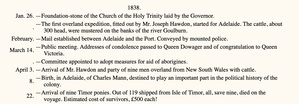 1838 page 147 'Arrival of nine Timor ponies. Out of 119 shipped from Isle of Timor, all, save nine, died on the voyage. Estimated cost of survivors, 500 pound each!'
1838 page 147 'Arrival of nine Timor ponies. Out of 119 shipped from Isle of Timor, all, save nine, died on the voyage. Estimated cost of survivors, 500 pound each!'
Summary of Postal Contractor by author
-
The first regular mail service between Mt Barker and Adelaide was established in about 1844 by a man named LUBASCH.
- LUBASCH also acted as Hahndorf's first postman. 'He usually conversed with Germans in the German language and with Englishmen in English.'
- His daughter would walk from Hahndorf to Mt Barker to collect the mail, returning on foot to Hahndorf, where her father would take it on to Adelaide in a small cart that he had brought out from Prussia with him, into which he had harnessed two Timor ponies.
-
He would make the trip to Adelaide one day, and return home the next. He did this mail run once per fortnight. After the opening of the railway service, the mail was carried by train for a time, and later still I twas, and still is transported by registered mail contractors to Adelaide.
-
Mr LUBASCH also secured the first mail contract, and twice a week his grey ponies went to and from Adelaide with mails, produce and provisions.
-
The same conveyance also brought the Mount Barker mails, which were carried to their destination on foot by one of Mr LUBASCH's family, when the blacksmith did not happen to be going that way.
-
If you took trip as a passenger in the "mail coach" of old man LUBASCH you would be quite safe in betting yourself that you would have a thrilling journey.
- The "coach" was a square wooden box without springs, mounted on to a wooden axle, and was capable of inflicting more bruises to the square inch than any other vehicle ever made.
- It was drawn by two lively Timor ponies, who shared their owner's belief that the straight course was the best course.
- LUBASCH never pinned himself to any particular route. He just went straight ahead, and you had to take what was coming to you. Fallen logs in the track were mere trifles. The skittish ponies cleared them triumphantly, and the "coach" followed the ponies as a matter of course.
- After a big cold, LUBACH would slowly remove his smoking Dreadnought from his mouth, gaze around to see if his passengers were still there, and remark pleasantly - "Dot was a good von."
- When he wasn't running the mails he was running a coffee house, and when he wasn't running the coffee house he was running the mails between Mt Barker and Adelaide.
-
But the only thing that ran the veteran of Waterloo was his pipe - a huge contraption that almost consumed the output of a tobacco factory. The man was never born who could separate him from his pipe.
5. LUBASCH, Hahndorf policeman.
- Reference: D.C. Mt Barker Heritage Survey [2004] - part 3. It is associated with a notable local personality...namely Sergent [sic] LUBASCH, Hahndorf's earliest policeman. [Authors Note: I have no evidence for this to date]
1850
Add a caption
|
|
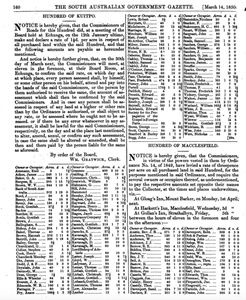 |
|
|
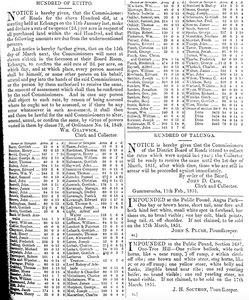 page 131. SA Government Gazette 20 February 1851 page 131. SA Government Gazette 20 February 1851 |
1851
page 131. SA Government Gazette 20 February 1851
6. Shearer’s: Daughters & Marriage
6.1 Extract from research presented at the GHRC Conference, Tanunda, South Australia, May 2022, by author
Prussian daughters over 15 years of age were likely taught by their mothers to shear the families sheep & they would likely continue to do that until they married and would then care for their own sheep. This was the case when they arrived in South Australia. It would have been lucrative for the families of the young women to be annually contracted out onto sheep runs near Hahndorf to shear for, usually, English farmers. It has been recorded that young women from the 'Zebra' began this in the first spring of 1839 and continued it up until at least the early 1850's […..years] during the labour shortage of the Gold Rush.
Theses same daughters are also recorded as going up to Mt Bryan, north of Burra to shear. [. ] In 1839 the 5 LUBASCH daughters were aged 16, 13, 11, 5 and 3 years. By comparing time frames for their marriages in South Australia it is possible to estimate how many seasons their labor assisted the parents income in the first 15 years of their arrival in Hahndorf.
6.2 The LUBASCH daughters began to marry shortly after arrival.
No 1 daughter Johanne Luise 20 years married WIETH 28 years in Prussia in the early 1840's did not come to South Australia until 1855.
No 2 Johanne Eleonore Henrietta 20 years married THIELE 22 years in 1841c. - 2 years after arrival.
No 3 Anna Dorothea 20 years married MACFARLAN 37 years in 1845. - 7 years after arrival.
No 4 Johanna Caroline 19 years married LIEBELT 23 years in 1847 - 8 years after arrival.
No 5 Anna Marie Dorothea 19 years married JÄNSCH 25 years in 1853 - 14 years after arrival.
No 6 Maria Elizabeth and LIEBELT became engaged in April 1856, 17 years after arrival. However they did not marry until 3 years after her father died, which was 1859 - 20 years after arrival.
6.3. By comparing when the young Prussian women turned 15 years & then the age that they married, I propose that the daughters each had a contracted shearing career of:
No 2 Johann Eleonore Henrietta: 15 years of age in 1837, shearing from 1839-1841 for 3 years.
No 3 Anna Dorothea: 15 years of age in 1839 years, shearing from 1840-1845, for 5 years.
No 4 Johanna Karoline: 15 years of age in 1842, shearing from 1842-1847, for 5 years.
No 5 Anna Marie Dorothea 15 years of age in 1848, shearing from 1848-1853, for 5 years.
No 6 Maria Elisabeth 15 years of age in 1850, shearing from 1850-1859, for 9 years.
If these calculations are reliable then their shearing income was brought into the household from September / October 1839 and continued for the next almost 20 years [1839-1859]. Each sister contributing in the unique way that young Prussian women were known to have sheared the local sheep.
6.4 Register, Tuesday 14 February 1911 page 7. Obituary of Johanna Dorothea LUBASCH.
'At the time of the Victorian diggings boom, when labour was scarce, Mrs JAENSCH used to go shearing, at which she could earn a substantial cheque'
6.5. 1930 "Early Mount Barker - Who Was Who?” - Rev. W. Gray, Mt Barker Courier July 11.
'Lachlan McFarlane was born in Argylshire in 1806. He came to Sydney in 1840. He brought livestock overland to Melbourne. Six months later he came to Mount Barker where he started sheep farming. He was amongst those who employed the young German women from Hahndorf to shear their sheep.'
6.6. Extract from: 'HAHNDORF - A Journey through the Village and its History', by Anni Luur Fox.
'By her superlative skill as a sheep shearer, Johanne Dorothea Louise attracted the attention of Lachlan MacFarlane, who became a prosperous landowner. After marriage they built the first part of the Oakfield Hotel in Mt. Barker which was later developed into a mansion called Auchendarroch by Robert Barr-Smith.'
7. German Arms Hotel
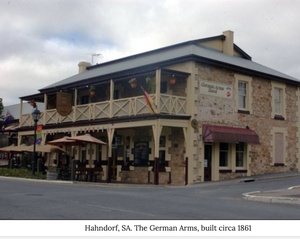 From 'Historical Australian Towns' This is NOT the original building for the German Arms.
From 'Historical Australian Towns' This is NOT the original building for the German Arms.
Hotels in the Adelaide Hills: patterns of development by Patricia Summering. 'Before Christmas in 1839, Hahndorf had its first inn, appropriately named the German Arms Inn which was established by Gottfried LUBASCH on the site of No 80 in the Main Street. By the time the hotel was rebuilt on the opposite side of the road on its present site in 1880, there were two other hotels that had been licensed in the township.'
District correspondent The Observer 2 September 1843]
(See South Australian Government Gazette 12 December 1839, Godfrey Luhbasch licensee of the German Arms Hotel.)
Gottfried LUBASCH built & operated the ‘German Arms’ between 1839-1949 & then leased out the premises.
1861 The Register [Adelaide, SA : 1839-1900] 18 February
On 13 February 1861, a fire did tremendous damage to the German Arms 'The fire started about 1 or 2pm ... a blaze between the chimneys and all round. Several people were in the bar, but they were all sober ... There was great destruction of property, a large number of bottles being broken ... Several cases of wine and spirits were brought out ... The furniture and effects are almost totally destroyed.'
1904 Adelaide Observer [SA: 1843-1904] Saturday 11 June page 36.
'The first buildings were made with poles sloping like the roof of a house and thatched with kangaroo grass, and the tracks were made through the bush by means of a team of bullocks dragging a Shea oak log. The first inn, opposite the present German Arms, was conducted by Mr LUBASCH, father of Mrs Christian JAENSCH. It was of wood, and was afterwards burnt down.'
1911 Obituary: Johanna Dorothea LUBASCH The Register [Adelaide, SA : 1901-1929] Tuesday 14 February 1911 page 7.
‘The deceased's father was a Waterloo veteran, and was the first licence of the original German Arms Hotel, which was destroyed by fire some 50 years ago.’ [Note: 1861]
Adelaide Hills Local Wiki German Arms Hotel [Original] - Hahndorf by Tony Finnis
LIEBELT Family History by LIEBELT & WITTWER page
He was a veteran of the Napoleonic wars and had take part in the Battle of Waterloo; in later years he became involved in debate with various English persons as to whether the Battle of Waterloo had been won before BLUCHER had arrived. In fact, out of all the early Hahndorf settlers, LUBASCH would have been the most frequently mentioned in the press and in historical writings [excluding pastors].'
Summary of German Arms by author
Also see Adelaide Hills Local Wiki, Reg BUTLER ‘German Arms Hotel (Original) - Hahndorf’
- Gottfried LUBASCH built the first German Arms directly across the street from the present hotel
- The first inn, opposite the present German Arms, was conducted by Mr LUBASCH, father of Mrs Christian JAENSCH. It was of wood, and was afterwards burnt down.
-
Early in 1839, Gottfried LUBASCH opened a coffee shop in his main street home.
-
1839 licensed to sell wine and spirits.
-
By December 1839, he had turned this business into a hotel, 'rather of the Germanic order'.
- He was the proprietor of the first public-house built at Hahndorf. It was a primitive and rustic little hostelry, celebrated in its day for home-made bread, sweet fresh butter, and delicious bacon.
-
December 1840 Mt Barker's miller, John Dunn, stayed at the German Arms 'My two brothers and I...asked for a bed, but couldn't get one in the house. We were told, however, that there was some native grass, lately cut for hay, in one of the sheds...Except for the tickling of thousands of grass seeds, we were happy enough... '
-
Sergeant LUBASCH an old Waterloo veteran, who subsequently became a local character as the keeper of a coffee house
-
The Germans at Hahndorf have a mill worked by bullocks, a general store, a respectable inn, kept by my honest friend Lubasch...where he is doing well... ' 1843.
- Gottfried LUBASCH built & operated the ‘German Arms’ between 1839-1949 & then leased out the premises.
- From 1849 Gottfried leased the German Arms to other licencees and was farming section 3812 which he purchased in 1844.
-
1849 James Ide had become publican and had kept up the well-deserved reputation until his death in 1851.
- 1851, The Arms: a small comfortable house, snug and clean, exceedingly well-conducted and more quiet than inns usually are.
- His widow married Francis Robert Hunt who took over management of the hotel. She died in 1859
-
A fire destroyed much of the original hotel building in February 1861, the year that the widower Hunt remarried.
- R HUNT shifted the hotel business across the street in 1862.
- His brother-in-law, Thomas Ide, was in charge in 1865 when the grand new hotel was completed across the road at No. 69 Main Street.
-
After Gottfried’s death his youngest daughter Maria Elisabeth LUBASCH rented out the ‘German Arms’ premises to the brothers in law Robert HUNT and Thomas IDE.
- The German Arms remained the sole hotel in Hahndorf until Gottlieb Schuetze established the Australian Arms in 1854.
- 1869 Wilhelm PAECH LTO title, husband of Maria LIEBELT, née LUBASCH, operated the ‘Union Inn’ at this stage, at the other end of Hahndorf’s Main Street.
8. Hahndorf Village land allocation
1839 the LUBASCH family - Gottfried 49 years and his second wife Anna Dorothea GREISER 41 years, newly arrived from the 'Zebra' with their own 4 daughters aged 13, 11, 5 and 3 years and accompanied by an older half sister, 16 years, were provided with house land [see ‘Original Allotments Sections 4002. 4003, 4004] close to the middle of the village as it stretched out along the main thoroughfare, number 80 Main Street Hahndorf. The eldest daughter from the first marriage stayed in Prussia until a year before her father died in 1856 & an infant daughter was thought to have died, perhaps on arrival in the Gulf,
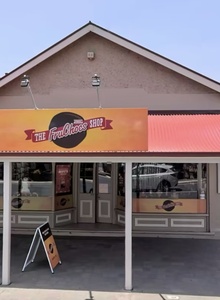 Reg BUTLER researched and recorded in the ‘Hahndorf Data Base’, the farming land that all the pioneers were allocated in 1839. Like everyone the LUBASCH's received land which was carefully divided up amongst the pioneers by H.F. KOOK [also a passenger on the ‘Zebra] so that each could have equal access to water and soil types including the three streams coming through the village. [Kook, Kavel's people page 164 + Zebra]
Reg BUTLER researched and recorded in the ‘Hahndorf Data Base’, the farming land that all the pioneers were allocated in 1839. Like everyone the LUBASCH's received land which was carefully divided up amongst the pioneers by H.F. KOOK [also a passenger on the ‘Zebra] so that each could have equal access to water and soil types including the three streams coming through the village. [Kook, Kavel's people page 164 + Zebra]
Alfred MILLER married Alma HAEBICH in 1899, they built the house and attached store at No 80-82 which was previously the ‘Four Square Store’ & now is ‘The FruChoc Shop’. Annie LUUR FOX
In 1968, the Education Department purchased the rear of this Sub-Lot to extend the grounds of the Hahndorf Primary School.
3567/89 current title
farmer
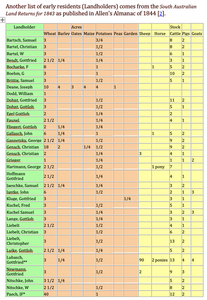 Adelaide Hills Localwiki Crops, SA Almanac 1844 'Gottfried Lubasch had 13 cattle.
Adelaide Hills Localwiki Crops, SA Almanac 1844 'Gottfried Lubasch had 13 cattle.
See Johann Gottfried LUBASCH part 3 for information about his land purchases, sales, and a time line for him moving from being a publican to becoming a framer on Section 3812. The families old home and barn have been conserved by the generosity of the PAECH family of Beerenberg Farm.
1851 Neighbouring farmers
|
<div> </div> |
1851 'LOCAL COURT, MOUNT BARKER., South Australian Register (Adelaide, SA: 1839-1900), 1 February, p. 2., viewed 31 Jul 2022, http://nla.gov.au/nla.news-article38449085
LUBASCH v. PAECH 'This was an action for 3 pound 10 shillings, special damages sustained by plaintiff from the trespass of defendants cattle. Defendant said the cattle were impounded by plaintiff, and that no mention was then made of damages, and that he paid the poundage and released the cattle. The Court held that plaintiff could not sue for special damages, as he had impounded the cattle. All he could have claimed would have been the rate assessed by the Justices for ordinary trespass. The defendant having expressed his readiness to pay the charges for ordinary trespass, the matter was so arranged. |
| Hahndorf pioneers in 1843 |
|
South Australian Land Returns for 1843 by Andrew & Sandra Twining.
|
| Summary of above families by author |
|
'GENSCH' is probably 'JAENSCH'.
‘LIEBELT ....... ‘
LUBASCH was already a publican in 1843, only one of his daughters had married [1839] & that was to the W. THIELE above. |
|
|
Adelaide Observer [SA :1843-1904], Saturday 18 October 1856, page 4. CHARGE OF CATTLE -STEALING - James CROSSWELL was charged with stealing two bullocks, the property of Gottfried LUBASCH, in the month of March last, at Hahndorf. Mr. ANDREWS for the prosecution; Mr. PARKER for the defence. James GATES deposed that he was a farmer at Mount Barker, and on passing Crafer's Inn, on Monday he saw prisoner, who had possession of a team of bullocks. Witness recognised two of the bullocks belonging to Gottfried LUBASCH, now lately deceased. Witness enquired respecting the two bullocks, and prisoner said he purchased them on the Burra-road, but could not give the name of the man from whom he purchased. He said that he gave 15 pound for them, and witness rejoined that he should like to purchase such a fine pair of bullocks for 15 pound. Prisoner made no reply, but witness asked him for his name and address, which the prisoner correctly furnished. Witness proceeded to describe the bullocks and his means of identifying them; and afterwards said that they were turned out in January last on the Onkaparinga, that they were subsequently missed, and searched for without success, till witness happened to see them at Crafer's. By M r. Parker- The prisoner told witness the he could produce the receipt when came into town, and witness had since been shown something like a receipt. [Produced in Court]. Christian JAENSCH, son in law of the deceased LUBASCH, gave evidence as to the identity of the bullocks. Mr. PARKER for the defence, called James TROWBRIDGE, who deposed that he knew the prisoner, and that he had worked the bullocks for two or three months past on the Mount Barker - road. The case was remanded, bail being taken for the prisoners appearance on Friday.
Authors Note: Unable to find on Trove a follow up sentencing result. |
Gottfried LUBASCH died
SAGHS. District of Mount Barker Deaths 1856-1879 microfiche: Gottfried LUBASCH, 66 year old farmer, died from pneumonia, in Hahndorf where he usually lived, and his death was reported by his son in law Christian JAENSCH of Hahndorf on the following day, 6 October 1856.
He died at Hahndorf in 1856, a wealthy man with considerable property.
|
|
On the 5th October, at Hahndorf, after a short illness, Gottfried LUBASCH, aged 65 years 11 months and 22 days. The deceased was one of the first settlers at Hahndorf, and was well known to all the earliest settlers in the District of Mount Barkers as an honest, industrious, and careful colonist, and was universally respected. He was also an old veteran of the Blucher school, having been present at the meeting of WELLINGTON and BLUCHER at Waterloo, and was amongst those who continued the pursuit of the defeated French after that battle; he was also in the disastrous retreat from Moscow, and experienced great sufferings in that memorable campaign. During the late war with Russia it was his constant practice to make repeated enquiries how the allies got on, and always expressed great satisfaction on hearing of any triumph the allies obtained over the Russians. He was a great admirer of the English nation and army."
This obituary was duplicated in the Adelaide Observer [SA:1843-1904] 11 October 1856 page 5.
|
|
Executrix named in and appointed by the last Will and Testament of Gottfried LUBASCH late of Hahndorf in the Province of South Australia Farmer deceased a true copy of which said last Will and Testament marked "A" is hereunder written did appear at the Supreme Court aforesaid and claim Probate of the said Will. Whereupon the same was proved approved and registered and the Administration of all and singular the goods and chattels rights credits and effects of the said Gottfried LUBASCH deceased was by order of the Court on the eighth day of July one thousand eight hundred and fifty seven granted unto the said Maria Elisabeth LUBASCH she having first sworn that she believed the paper writing annexed to the affidavit of Christian JAENSCH and Anna Dorotea [sic] JAENSCH sworn the twentieth day of October one thousand eight hundred and fifty six and filed in this Honorable Court to be the true last Will and Testament of the said Testator who died Hahndorf aforesaid on the fifth day of October one thousand eight hundred and fifty six. And that she would well and truly execute the said last Will and Testament of the said Maria Elisabeth LUBASCH would make and exhibit unto this Honorable Court a true and perfect Inventory all the goods and chattels rights credits and effects of the said deceased on or before the twenty ninth day of July thence ....and that she would also Render a just and true account of her executorship when she might be lawfully called upon so to do and lastly that she the said deceased within the said Province and its dependencies at the time of his death did not exceed in value the sum of One thousand pounds. Given at Adelaide their tenth day of July in the year of our Lord one thousand eight hundred and Fifty seven under my hand and the seal of the Supreme Court of the Province of South Australia. Benjamin BOOTHBY, Judge. |
14. Anna Dorothea GREISER WILL
1864, 19 October, Anna Dorothea LUBASCH nee GREISER died leaving all to youngest daughter Maria Elisabeth LUBASCH, now married [1859] with two daughters [Auguste Bertha b1860, Maria Louise b1863] to Johann Gottfried LIEBELT.
The will was made on the 28 August 1863
A
- This is the Last Will and Testament of me Anna Dorothea LUBASCH born GREISER of Hahndorf in the Province of South Australia widow of the late Gottfried LUBASCH of the same place I devise and bequeath All the personal property to which I shall be entitled at the time of my decease unto my dear Daughter Mrs Maria Elisabeth LIEBELT, born LUBASCH absolutely, and I appoint the said Maria Elisabeth LIEBELT born LUBASCH, sole Executrix of my Will hereby revoking all other Wills and Testamentary dispositions. In witness whereof I have hereunto
245
- set my mark the twenty eight day of August in the year of our Lord one thousand eight hundred sixty three [1863] LUBASCH Anna Dorothea “XXX” her mark. Signed by the mark of the said Testatrix as her last Will and Testament in the presence of us present at the same time who at her request in her presence and in the presence of each other have hereunto subscribed our names as witnesses.
- Heinrich MARTIN of Hahndorf, Wheelwright.
- Edward GREGOR of Hahndorf, Farmer,
"Australia, South Australia, Will and Probate Records," database, FamilySearch (https://familysearch,org/ark:61903/1:2:79G5-NTPZ:26 September 2019) Entry for Anna Dorothea Lubasch, 28 August 1863; citing Will, South Australia, Australia, Probate and Administration Books, Supreme Court of South Australia, Adelaide; FHL microfilm 103177745.
Author’s note:
- Heinrich MARTIN wheelwright Hahndorf
- Edward Gregor farmer Hahndorf
15. Johann Gottlieb WIETH WILL
1881, 25 September, Johann Gottlieb WIETH, 69 years died, leaving all to youngest daughter Maria Elisabeth LUBASCH, now married [1859] with two daughters [Auguste Bertha b1860, Maria Louise b1863] to Johann Gottfried LIEBELT.
The will was made on the 12 November August 1888
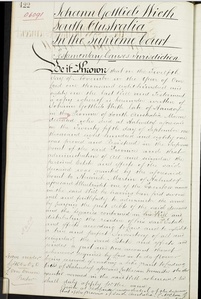 |
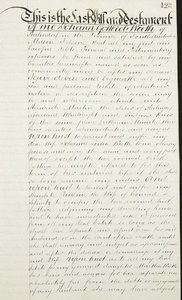 |
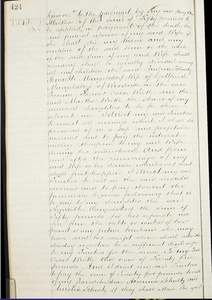 |
|
|
|
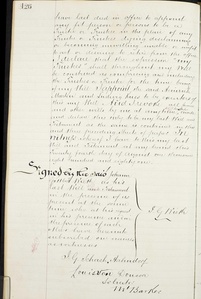 |
422 06091. Johann Gottlieb WIETH South Australia in the Supreme Court Testamentary Causes Jurisdiction Let it Known that on the twelfth day of November in the Year of Our Lord one thousand eight hundred and eighty one the last Will and Testament a copy whereof is hereunder written of Johann Gottlieb WIETH late of Hahndorf in the Province of South Australia Mason, deceased who died at Hahndorf aforesaid on the Twenty fifth day of September one thousand eight hundred and eighty one was proved and Registered in the Supreme Court of the said Province and that administration of all and singular the personal estate and effects of the said deceased was granted by the aforesaid Court to Heinrich MARTIN of Hahndorf, aforesaid Wheelwright one of the Executors named in the said Will be having been first sworn well and faithfully to administer the same by paying the just debts of the said deceased and the legacies contained in his Will and distributing the residue of his said Estate and effects according to Law and to exhibit a true and perfect Inventory of all and singular the said Estate and effects and render a just and true account thereof whenever required by Law so to do power being reserved of making a like grant to Ludgwig KRESS of Hahndorf aforesaid, Lutheran Minister the other executor named in the said Will whenever he shall duly apply for the same. Given at Adelaide under the seal of the Supreme Court of the Province of South Australia. Sworn under 400 pound, L Von Doussa Proctor.
Author’s note:
- Heinrich MARTIN wheelwright Hahndorf
- Ludwig KRESS / KUSS Lutheran Minister, Hahndorf.
- L Von DOUSSA Proctor
423. This is the Last Will and Testament of me Johann Gottlieb WIETH of Hahndorf in the Province of South Australia, Mason, I desire that all my just and lawful debts Funeral and Testamentary expenses be paid and satisfied by my Executors hereinafter named as soon as conveniently may be after my decease. I give devise and bequeath all my real and personal Estate of whatever nature or description the same may be and wheresoever situate unto Heinrich MARTIN the elder of Hahndorf aforesaid wheelwright and Ludwig KUSS of the same place Lutheran Minister the heir executors executors administrators and assigns upon trust to permit and suffer my dear wife Johanne Louise WIETH to use occupy possess and enjoy the same and every part thereof except the two roomed brick cottage hereinafter referred to for the term of her natural life is she shall so long remain my widow and upon trust to permit and suffer my daughter Pauline the wife of Conrad SCHUETZ to occupy the two roomed brick cottage adjoining my dwelling house and to have unrestricted use of firewood from my Real Estate so long as she shall live separate and part from her said husband or in the event of his death until she shall remarry and subject as aforesaid from and after the decease or remarriage of my said wife upon trust as to all my Real Estate for my youngest daughter Martha WIETH her heirs and assigns for her separate use absolutely free from the debts or engagements of any husband she may have subject
Author’s note:
- All to his wife Johanne Louise WIETH so long as she does not remarry
- except the two roomed brick cottage adjoining my home,that is to be occupied by my daughter Pauline the wife of Conrad SCHUETZ
- Pauline can have unrestricted use of firewood from ‘my real estate’ so long as she lives separate and part from her said husband.
- or in the event of his death until she shall remarry
- and after the decease or remarriage of my said wife all my Real Estate goes to my youngest daughter Martha WIETH
- and Martha’s heirs and assigns for her separate use absolutely free from the debts or engagements of her husband.
- Also to Martha fifty pound for the payment of the death bed and funeral expenses of my wife if she shall died my widow.
-
any surplus of the fifty pound or if my said wife shall remarry shall be equally divided amongst all my children
- the said Pauline SCHUETZ,
- Henriette MANGELSDORF wife of Gottfired MANGELSDORF of Woodside in the same Province, farmer, Oscar WIETH
- Martha WIETH
- the shares of my married daughters to be for their separate use.
- all moneys to be invested & the interest goes to my wife during her widowhood, if she remarries or when she dies then
- To Henriette MANGELSDORF, fifty pounds, free from the debts or control of her present or any future husband
- & to Oscar WIETH twenty five pounds
- & twenty five pounds to each of my grandchildren Henriette SCHUETZ & Aurelia SCHUETZ
- & invest twenty five pound & pay the interest to Pauline SCHUETZ
- the residue of my property to Martha WIETH
1899, 16 May, Johanna Luise WEITH 79 year old, died leaving her estate to her youngest child 39 year old Martha FAEHRMANN nee WIETH, (1860-1927) wife of Friedrich Wilhelm FAEHRMANN, Carter, Hahndorf.
5804. South Australia In the Supreme Court Testamentary Causes Jurisdiction. On the twenty second day of June Letters of Administration of the Estate of Johanna Louise WIETH late of Parkside in the Province of South Australia Widow deceased who died at Parkside aforesaid on the Sixteenth day of May 1899 intestate were granted by the Supreme Court of South Australia to Martha FAEHRMANN wife of Friedrich Wilhelm FAEHRMANN of Hahndorf in the said Province, Carter one of the natural and lawful children and next of kin of the said deceased.
Estate sworn not to exceed in value 250 pound. Dated this 22 day of June 1899. Aug STOW, Registrar. Extracted by Louise von Doussa, Proctor, Mount Barker.
Author’s note:
- Louise von DOUSSA, Proctor, Mount Barker.

